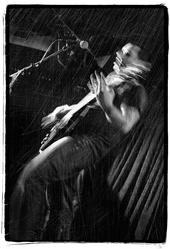HOPE FOR THE GOOD is a band formed not only out of a love for NYC legends Quicksand, but out of necessity. We love this music with all of our hearts. It needs to be played once again. Whether you listen or not- because this is about us, not about you. This band is 100% about the members participating.
If you sealed us off from the rest of the world, we'd just play this music to four walls- isolated, alone and content. That being said, we hope you join us to share this memory.
We will be playing shows in New York City in Summer 2008.
ABOUT QUICKSANDQuicksand emerged from the ashes of the failed Moondog project and grew into one of the most underrated bands of the 1990s. From their first show in the condemned tenement, ABC No Rio in New York City, to their break-up on October 12, 1995 after a show at the Hollywood Grand in Los Angeles, Quicksand created some of the most progressive music of the decade. Since their break-up a small, but dedicated fan base has kept the hope alive that the rest of the world will someday catch on.Like many musicians that came of age in New York's hardcore scene, the band members themselves suffered through humble beginnings. Each of them cut his teeth in other local bands- Walter Schreifels with Youth of Today and the Gorilla Biscuits, guitarist Tom Capone with Bold, drummer Alan Cage with Beyond, and bassist Sergio Vega with Absolution.Quicksand's first release on the hardcore label Revelation came just six weeks after the band formed, preceding Nirvana's Nevermind and hinting at the driving guitar sound that would come to dominate the first half of the 90s. While comparisons to Helmet and Fugazi come easy because of each band's hardcore roots, those comparisons do little justice in describing Quicksand's sound.That first release and constant touring of North America and Europe with bands like Helmet, Fugazi, Rage Against the Machine, and White Zombie, as well as their own club dates, caught the attention of Polydor. In 1993 Quicksand released Slip, their full-length, major-label debut. Even though the video for "Dine Alone" made into regular rotation on the heavy metal segments of MTV, the record never achieved the sales Polydor was looking for.In 1995 came the Island Records release Manic Compression, a more complex record, musically and lyrically, when compared with the easily likable rhythms on Slip. The record helped put Quicksand on the first Vans Warped Tour, but did not build upon Quicksand¹s fan base.The stress of constant touring took its toll on the band and in October 1995 they disbanded.
